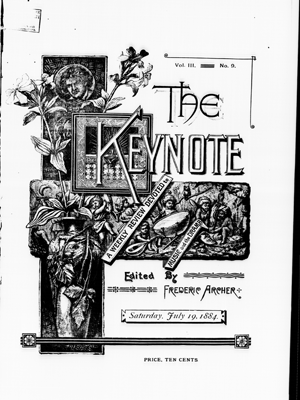The Keynote
RIPM Preservation Series: European and North American Music Periodicals (2017)
 Editors: Frederic Archer, J.O. von Prochazka
Editors: Frederic Archer, J.O. von Prochazka Publisher: Edward Lyman Bill, 1895-1897
Distributor: The American News Company, 1883-1890
Periodicity: Weekly, 1883-1889; Monthly, 1889-1897
Forthcoming: Vol. 3 no. 1, Vol. 15 no. 7
Lacunae: Vol. 6 no. 13; Vol. 12 no. 7 - Vol. 14 no. 3; Vol. 14 no. 5 - Vol. 15 no. 5; Vol. 15 no. 8 - Vol. 16 no. 6; Vol. 16 no. 11 - Vol. 17 no. 2; Vol. 18 no. 5. No copies could be located.
"It is asserted by some that musical journalism in New York has reached its limit, and that the musical public and the trade have even ceased to regard it as a desirable institution. We are satisfied that such is not the case..."
So wrote Frederic Archer (1838-1901), founder and editor of The Keynote, in the inaugural issue. Archer's reference to a "limit" indicates the remarkable extent of music and musical journalism in late nineteenth-century New York. In 1883, no fewer than five music journals were already published in the city, including a short-lived daily music newspaper. In addition, musical writing appeared in the daily press, non-specialized journals, and music journals published elsewhere in the United States with readers in New York. Archer identified the need for a music-focused, independent journal, not tied to a publishing house or the trades, which could serve as a reliable, general journal.
Born in Oxford (England) and a successful organist and composer—he served as organist in Henry Ward Beecher's church in Brooklyn—Archer modeled The Keynote's layout and scope on English music journals of the period, providing readers with an expansive view of the musical world, unencumbered by copious advertising. A trade supplement, "Music Trade Matters," is a regular feature. In 1888, J. O. von Prochazka became the editor; additional illustrations were introduced and a greater emphasis was placed upon musical personalities. Above the masthead, the new editor also introduced a handwritten endorsement by the composer Arthur Sullivan: "The Keynote is the only good musical paper I know" (emphasis Sullivan's). Musical supplements begin to appear in this time.
The Keynote begins to shrink in the late 1890s; in 1897, The Keynote merged into the Music Trade Review.
